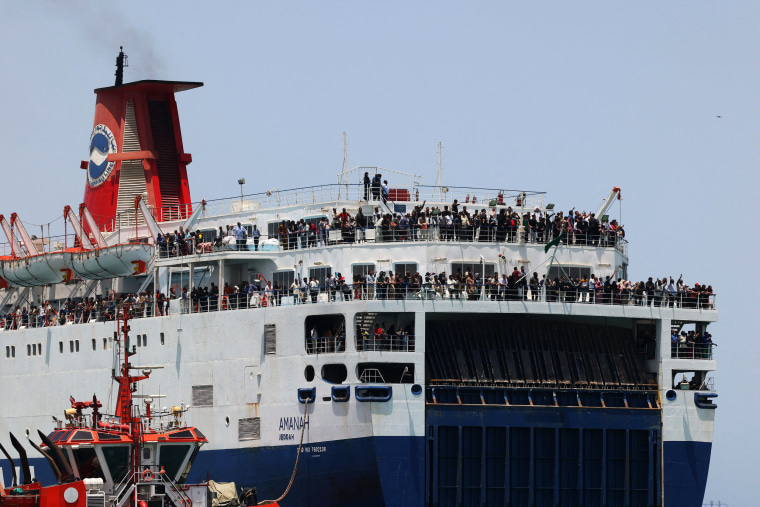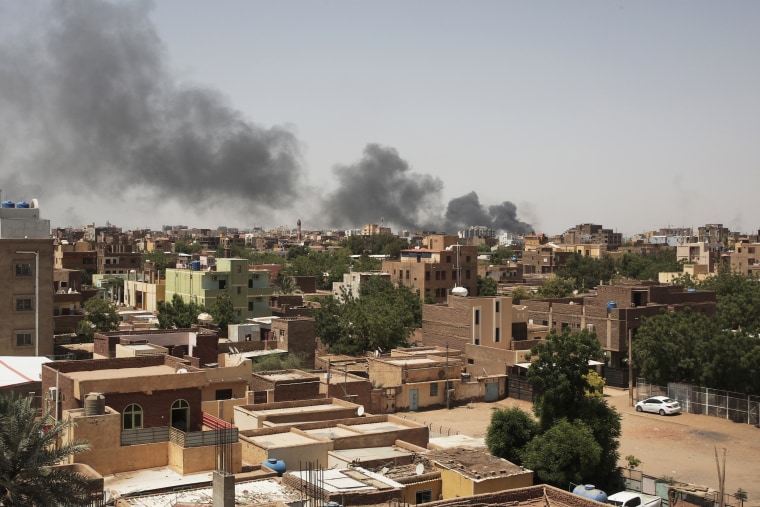Hundreds of American citizens have left Sudan by land, sea and air, the State Department said late Friday as fighting continued despite the extension of a fragile truce between the country’s two top generals.
A convoy carrying Americans, locally employed staff, and "nationals from allied and partner countries," arrived at Port Sudan on Saturday where the U.S. government will assist citizens and any who are eligible with travel to Jeddah, Saudi Arabia, according to a statement from the U.S. Department of State.
It's not known at this time how many Americans are on the convoy.
"This builds on the work the U.S. government has done this week to facilitate the departure of our diplomats by military assisted departure, and hundreds of other U.S. citizens by land convoys, flights on partner aircraft, and sea," said Matthew Miller, the department's spokesperson.
Miller added that "intensive negotiations" by the U.S. with the support of "regional and international partners" created the conditions allowing the evacuation of citizens and non-citizens alike, including Saturday's operation.
"We continue to call on the Sudanese Armed Forces and the Rapid Support Forces to end the fighting that is endangering civilians," said Miller, adding that Americans are encouraged not to travel to Sudan.
Deputy Pentagon Press Secretary Sabrina Singh said the Secretary of Defense approved a request for assistance from the Department of State to support the safe departure of U.S. citizens and their immediate family members via overland travel.
“The Department of Defense deployed U.S. intelligence, surveillance, and reconnaissance assets to support air and land evacuation routes, which Americans are using, and we are moving naval assets within the region to provide any necessary support along the coast,” Singh said. “Our focus has been and remains to help as many U.S. citizens depart as safely as possible.”
A U.S. official confirmed to NBC News on Saturday that the U.S. government-organized convoy that evacuated American citizens from Khartoum to Port Sudan was protected by armed U.S. drones that flew above it.
The U.S. government is likely to release more exact figures of the number evacuated in the convoy once the Americans have made it safely to Jeddah, the official said.
One Friday, State Department Spokesperson Vedant Patel said that fewer than 5,000 citizens requested additional information from the U.S. and of those only a fraction had actively sought assistance to depart Sudan. “Several hundred U.S. citizens “have already departed Sudan, either by land, sea or aircraft,” he added.
Saudi Arabia's foreign ministry said in a statement Saturday that U.S. nationals were among almost 1,900 foreign evacuees who arrived in the port of Jeddah by ship on Saturday. It did not say how many Americans were on board.

While several countries have evacuated nationals by air, some have gone via Port Sudan on the Red Sea, around 500 miles by road from Khartoum.
Around 16,000 American citizens were in the country before the violence broke out just over two weeks ago.
While U.S. personnel were evacuated from the U.S. Embassy last week, some have criticized the length of time it has taken to organize civilian evacuations.
Denise Bowers and her husband Chris told NBC News on Thursday that they made it to the Egyptian capital Cairo after an arduous journey that involved travel by bus and ferry.
Chris, 53, said they watched the U.S. Embassy evacuation from their apartment in Sudan’s capital Khartoum, but had to make their own way out of the large African nation.
Denise, 52, who had been working as a teacher, added that the U.S. government “had absolutely nothing to do with us getting out safely,” although the embassy had been aware that they were in Sudan. She said that they had been advised to join a convoy traveling from the Turkish embassy.
Chris added he was glad they had escaped but he “felt bad” for those left behind. “The fact that we got on a bus and half of our friends couldn’t come with us made us feel horrible,” he said.
The couple returned from Egypt to Bluffton, South Carolina, late Friday.
Along with thousands of others, they were forced to leave after the military and its partner turned rival, the Rapid Security Forces, began battling for control of the large African nation’s major institutions earlier this month.

The country’s top commander and de facto ruler, Gen. Abdel Fattah Burhan, and his former deputy, Gen. Mohammed Hamdan Dagalo — a former camel dealer widely known as Hemedti who leads the Rapid Security Forces, had previously teamed up to co-orchestrate the coup that overthrew the government in October 2021.
But the alliance between the two military leaders spectacularly broke down over how to manage the transition to a civilian government, a disagreement over how the Rapid Security Forces should be integrated into the armed forces and what authority should oversee the process.
Chris said it was “pretty scary” and he could hear warplanes flying and shooting missiles and “bullets whizzing over our heads.”
Since then, at least 512 people have been killed and close to 4,200 wounded, according to the United Nations, although it is likely the real death toll is much higher.
The bombardments, gun battles and sniper fire in densely populated areas have hit civilian infrastructure, including many hospitals. Several attempts at a cease-fire have so far failed.
However, Volker Perthes, U.N. special representative in Sudan, told the BBC Saturday, that the sides had nominated representatives for talks which had been suggested for Saudi Arabia, or in South Sudan, though he said there was a practical question over whether they could get there to “actually sit together.”
He said no timeline had been set for talks, adding that both sides “think they will win, but they are both sort of more open to negotiations.” He added that “the word ‘negotiations’ or ‘talks’ was not there in their discourse in the first week or so.”